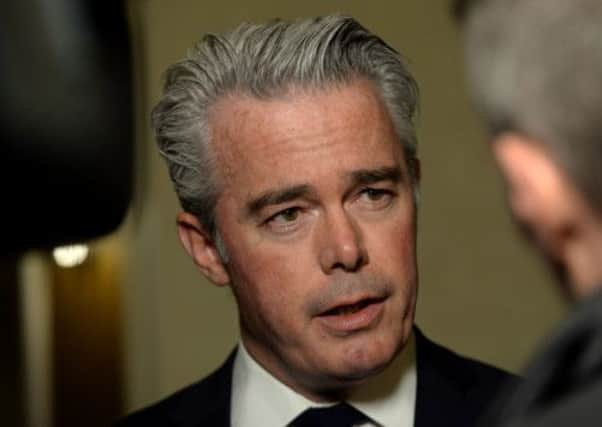Glenn Gibbons: Rangers and Murray manifesto


Following a period of relatively harmless sniping, this initial full-bodied assault by the rebels took the form of what may be called a manifesto. It is a declaration of principles and promises, articulated by Alex Wilson, who, along with Paul Murray, Malcolm Murray and Scott Murdoch, is seeking election to the board and the consequent eviction of most of the directors already there.
To anyone looking for unmistakable signs of the political astuteness, oratorical potency and immovable resolve necessary to drive a successful revolution, the charter would be notable instead for its general weakness, as well as its off-putting tone; the self-styled “constitution” gives off a malodorous whiff of condescension, making predictable pledges of the type a disenchanted support would want to hear.
Advertisement
Hide AdAdvertisement
Hide AdThe impact of the document’s supposedly headline article, the quartet’s No 1 priority, is immediately reduced by being itself based on mere rumour. This is the claim by the wannabes that they will never sell Ibrox, that “we will ring-fence the asset to ensure this can never happen. This is our home and will always remain our home”.
It is a curious proclamation, not least because their worry that the current directors will unload the stadium and lease it back from the purchaser is rooted in hearsay, rather than evidence. Wilson himself admitted that his group’s anxiety has no proper foundation: “The sale of Ibrox is definitely a concern. It has bounced around as a rumour since John Brown stood on the steps outside Ibrox and said ‘show us the deeds’.”
The rebels will know, too, that, despite its scale and appearance, the stadium has surprisingly little value. With the main stand a listed building and planning permission for any potential developer an elusive target, the site has very limited appeal. If it were to be bought and then rented by the sellers, it is extremely unlikely that Rangers would ever be evicted. In the Murray manifesto, the stadium “issue” is followed by a series of ideals that includes a commitment to fan representation on the board, equal treatment of every shareholder and the rather startling vow that there will be “total transparency in all the club’s affairs”. That last item will be a first in the entire history of business and commerce.
It also betrays the Murray team’s unseemly readiness to promise anything that might attract voters to their cause. The great majority of Rangers shareholders, however, would not expect “total transparency in all the club’s affairs” because they will realise that stock-market regulations make it impossible. The rules prohibit the public revelation of business that could affect the company’s share price.
Eyebrows would probably have shot skywards, too, at the quite unambiguous assurance that “there will be no long-term debt”. In normal circumstances, this could appear to be a fanciful boast, but Wilson and his fellow travellers are obviously cognisant of the reason behind their self-certainty: it is that, following the oldco’s collapse with liabilities amounting to millions, no potential lender or creditor will henceforth allow debt of any duration, long or short.
The deep misgivings of the prospective challengers to the present regime at Ibrox – as well as those of thousands of supporters – are entirely understandable, given the financial haemorrhaging at Rangers for the past 15 months or so. But their hand-on-heart commitment to “investigating” the cause of the losses (£14 million according to the annual returns at the end of June) is mere politicking.
The Murrays, Murdoch and Wilson will know as well as anyone that the liquidation in 2012 may have eradicated Rangers’ debt, but it did not warrant the celebration that spread through the ranks of the club’s support; the price to be paid was a future of up-front, cash-on-delivery demands from all suppliers, including transactions involving the acquisition of players.
Whichever faction is in power after the annual meeting in 11 days’ time – and neither so far has been especially persuasive – that burdensome legacy will not become any easier to bear.
Smith for sacking all year round
Advertisement
Hide AdAdvertisement
Hide AdIn his role as chairman of Scotland’s managers and coaches association, Alex Smith once had occasion to phone a member who had just left his job “by mutual consent”, according to media reports. “I’ve just read you quit your job, is that true?” asked Smith, in something of a panic. “No, no, I got the sack, and I’ve got my contract paid up,” came the reply.
“Oh, thank God for that,” said a relieved Smith. “We can’t have people just walking out. We have to make sure you get the sack.” The former manager of many clubs doubtless spluttered into his cornflakes one morning this week on reading the news that Owen Coyle had, indeed, resigned as manager of Wigan before he could be sacked.
His heart would have been back in his chest, however, when he reached the detail which confirmed that Owen had not exactly betrayed the brotherhood by simply walking out. He had, instead, offered to resign and Wigan’s chairman/owner, Dave Whelan, fully supported his decision.
“I didn’t actually sack Owen,” said Whelan. “I had a meeting with him after the match (a third home defeat inside a week) and told him I was disappointed in his performance. Owen said, did I want him to resign? I said yes.
“Obviously we’ve got to pay compensation, but I accepted it and he has resigned”.
At ease, Alex.